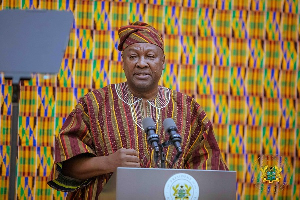Mr Hackman Owusu-Agyeman, a former Minster for Water Resources, Work and Housing in the erstwhile Kufuor Administration, has appealed to the government to adopt “Mentor Protegee System,” under which foreign companies operating in the country would mentor local Ghanaian companies.
He said the “Mentor Protegee System” was used in the US years ago which allowed bigger enterprises take on board smaller enterprises, gave them technical assistance and training, sublet contracts to them and helped them to develop.
Mr Owusu-Agyeman made the appeal on Wednesday in Accra at the Third Edition of the Graphic Business – Fidelity Bank Economics Dialogue, on the theme: “The Role of SMEs in Ghana’s Economic Development”.
He said Boeing was made to mentor other companies in the US by giving them contracts to manufacture parts of planes and this served them well.
Mr Owusu-Agyemena said; “Mentor Protegee System” should be made part of the local content system so that there could be targeted assistance for SMEs.
He said companies being mentored would in turn benefit from the state through subventions, adding that companies constructing high rise buildings were either Italian or Chinese but these could be made to mentor local companies.
Dr Ekow Spio-Garbrah, the Minister of Trade and Industry, said the government could take the recommendation very seriously to help grow the economy.
He said from January 2015, the Ministry would embark on a crusade against the high interest rate regime pertaining in the country, which was obstructing the growth of SMEs.
He said interest rates of banks ranging from over 20 per cent to 31 per cent could be classified as one of the highest Dr Spio-Garbrah said in some countries’ such as the US there were certain loan facilities such as car loans which attracted zero per cent interest.
He urged the Bank of Ghana to come out with a policy which would make loans for agriculture and SMEs attract lower interest rates.
He said the government would continue to play a key role as facilitator and catalyst for the growth of SMEs and urged SMEs in the importing sector to graduate to the level of manufacturing of some products.
Mr Julius Debrah, the Minister for Local Government and Rural Development, said SMEs would create jobs at the local level for the people and by doing so help uplift their standard of living.
He mentioned that the challenges facing the SMEs in the country were access to affordable loans and capacity building.
The Managing Director of the Graphic Communications Group Limited, Mr Kenneth Ashigbey said media work was not just about holding people accountable but also to ensure that the issues they raised were also executed.
He said the purpose of this year’s Economic Dialogue was to empower SMEs to move the nation’s development into the full status of a middle income country.
Mrs Mawena Trebah, the Chief Executive Officer of the Ghana Investment Promotion Centre, suggested graduation of the trading sectors into industries.
Madam Sarah Tsien Zetterli, Procredit Managing Director, said it was pivotal that electricity supply should be made available and constant to SMEs to make their work easier.
Business News of Thursday, 13 November 2014
Source: GNA












